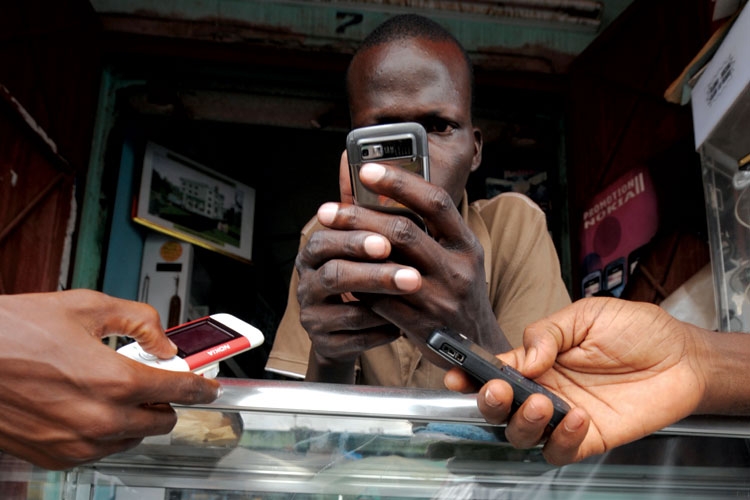In Ghana, it would be an “anomaly” for a supermarket, small store, or business merchant to not use a mobile money service for transactions. Daniel, a colleague at TechCabal, who visited Ghana two weeks ago said the same during a recent meeting.
Mobile money was first introduced in Ghana in 2009. However, it took some time for it to gain traction due to a restrictive Branchless Banking policy of the Bank of Ghana.
New agent and electronic money guidelines were released in 2014, allowing network operators to run mobile money services, with supervision from the banking regulator.
Ever since, players such as MTN have invested heavily in mobile money operations with great success. The telco giant launched its MoMo service in January 2017. By January 2019, over 100,000 merchants were using the service.
Uptake in mobile money services and financial inclusion have equally increased across the country. A March 2020 Summary of Economic and Financial Data published by the Bank of Ghana showed that the country had 14.7 million active mobile money accounts and 235,000 active agents.
On the other end of the cardinal point is M-Pesa’s success in East African countries, particularly Kenya. The mobile money service, owned and operated by telco Safaricom, has significantly contributed to improving the financial inclusion rate in Nairobi.
In Ethiopia, the government is banking on a mobile money service run by the state-owned network operator, Ethio Telecom, to increase financial inclusion among low-income groups. The service soared to more than 1 million registered users in one week, 4 million in a month, and 6 million in two months.
Despite being home to Africa’s largest unbanked population, Nigeria has not witnessed the same exponential growth in mobile money adoption and lags behind its regional peers when it comes to penetration.
Chasing financial inclusion
Financial inclusion for 200 million Nigerians has been a much-touted priority of Muhammadu Buhari’s administration and the central bank under governor Godwin Emefiele’s leadership. Still, it’s a goal that has been elusive.
Nigeria has a significantly large population without access to financial services. In 2017, it was home to 3.4% of the world’s unbanked people despite contributing 2.6% to the global population.
Some progress has been made over the past decade to bring more Nigerians under the formal financial system, according to a report by EFinA, but the figures remain disturbing.
At the end of 2020, over 36% of the adult population (or 38 million adults) were unbanked as the central bank missed out on its 80% national financial inclusion target. In addition, just over 40 million out of an estimated 105.5 million Nigerian adults have bank verification numbers (BVN), an important metric for gauging how many people have access to financial services.
The CBN has adopted several measures – such as the creation of special Payment Services Banks (PSBs) in 2018 – to drive financial inclusion.
However, the apex bank has shown reluctance towards adopting a framework that has proved to be very effective in improving financial inclusion in many African countries: telecoms-driven mobile money services.
Payment service banks, not mobile money operators
In 2018, CBN announced a new regime that would allow non-financial companies to apply for mobile banking licences – either as PSBs or Mobile Money Operators (MMOs).
Under the guidelines, mobile network operators are allowed to provide financial services to millions of unbanked Nigerians. However, they can do so only as payment service banks and through a subsidiary separate from their core operations.
Payment service banks are like small-scale banks. While they’re similar to typical banks, the scope of their license is strictly to deepen financial inclusion and the regulator forbids them from engaging in credit risk and foreign exchange operations.
More than two years after the CBN’s announcement, just three companies (including mobile operators 9mobile and Globacom) have been granted PSB licences. The two other network companies in the country, MTN and Airtel, are yet to get a regulatory nod to launch their Payment Service Banks. Although the former launched an agent network for money transfers in 2019.
The lack of progress on licences – particularly for two telcos that have significant mobile money experience in other markets in sub-Saharan Africa – calls into question how dedicated the central bank is to really broaden access to financial services in the country.
Some industry stakeholders blame the issue on lobbying by traditional financial institutions said to be wary of telco-led mobile money services. Banks perceive that network operators would claim their territory if allowed to offer standalone financial services.
According to one telecom industry expert who asked not to be named, the “big banks are fighting back behind the scenes to ensure telcos don’t come to have their lunch.”
Will telcos ever lead?
In Nigeria, the mobile money landscape is dominated by banks, technology, and financial services companies. Contrary to what is seen in Kenya and Ghana, telecoms operators are not allowed to apply directly for mobile money licences and are instead restricted to the provision of network infrastructure for the use of mobile money operators.
The regulatory framework is one of the core reasons why mobile money uptake has been relatively slow in Nigeria. As of 2019, there were just over 15 million mobile money accounts in the country, compared to nearly 60 million in Kenya, which is home to fewer than 55 million people.
Fintech companies have recorded significant strides towards advancing financial inclusion in Nigeria. Companies such as Paga and Teamapt democratise access to financial services through their agent networks and mobile payments infrastructure.
But telecoms companies are more positioned to deepen mobile money services due to their subscriber numbers, available infrastructure, and broader agent networks, which outnumber those of banks and fintechs. MTN and Airtel agents can be seen selling recharge cards in nearly every corner of the country.
“The telecoms industry has ready infrastructure and resources to push financial inclusion all over the country. If you truly want to deepen the use of mobile technology for financial service, the last mile to reach the people is through network operators,” the expert said.
There have been calls for a more liberalised regulatory framework where telcos lead. However, if the CBN’s latest mobile money regulatory framework published July 9 is anything to go by, network operators will continue to play the second fiddle in Nigeria’s mobile money space under the current administration.
In the new framework, the banking regulator reiterates its long-held stance that Nigeria will not adopt the model in which telecommunications companies are the drivers of mobile money services.
“The CBN recognises the importance of Mobile Network Operators in the operations of mobile money services and appreciates the criticality of the infrastructure they provide. However, the telco-led model (where the lead initiator is an MNO) shall not be operational in Nigeria,” the 40-page document reads.
The framework stated only two acceptable models for the implementation of mobile money services: bank-led (bank and/or its consortium as lead initiator) and non-bank-led (a corporate organisation duly licensed by the CBN as lead initiator).
Although the CBN says it recognises the importance of telecoms companies in providing the infrastructure to drive the exchange of messages for mobile payments, it feels compelled to prohibit the Telco-led option. This, according to the bank, is to “retain full control of monetary policy operations, minimise risks and ensure that the offering of financial services is driven by organisations that have been licensed to do so.”
After failing to meet its 2020 target, the CBN has revised its financial inclusion goal to 95% by 2024. But with its continued regulatory conservatism towards telecoms-led mobile money, the regulator is likely to find it only more difficult to bring millions of unbanked Nigerians into the financial system.
“CBN’s models will only slow down financial inclusion penetration,” the expert said. “Instead, telecoms companies should be allowed to take the lead in the mobile money space as seen in other African countries. This is the only way speedy coverage and easy access can be achieved and financial inclusion improved.”




















